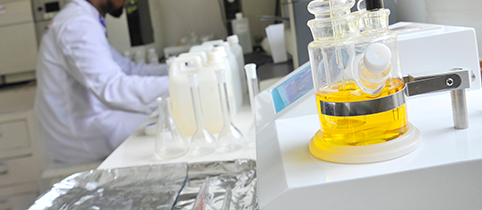MINERAL AND FUELS ANALYSIS

Mineral and fuel testing is a vital process that involves analyzing various natural resources, such as minerals, ores, coal, petroleum, and natural gas. This testing is crucial for resource exploration, extraction, processing, and ensuring compliance with industry standards and regulations. Here's an overview of mineral and fuels testing:
- Mineral Analysis: Mineral testing determines the composition and properties of minerals and ores. It includes identifying minerals present, assessing their purity, and analyzing valuable components, such as precious metals (e.g., gold, silver) in ores.
- Elemental Analysis: Elemental analysis determines the concentration of various elements in mineral samples. This data is essential for process optimization, quality control, and assessing the economic viability of mining operations.
- Coal Quality Testing: Coal testing involves evaluating the quality and properties of coal for various applications, including energy generation and industrial processes. Parameters such as calorific value, ash content, sulfur content, and volatile matter are assessed.
- Petroleum Quality Testing: Petroleum testing ensures the quality and compliance of crude oil and refined products. It includes testing for properties like density, viscosity, flash point, sulfur content, and distillation characteristics.
- Natural Gas Analysis: Natural gas testing evaluates the composition and quality of natural gas. This includes analyzing the content of methane, ethane, propane, and other components, as well as impurities like sulfur and moisture.
- Energy Content: Testing laboratories determine the energy content of fuels, including fossil fuels like coal, petroleum, and natural gas. This information is crucial for energy producers and consumers in making informed decisions.
- Environmental Testing: Mineral and fuel testing also involves assessing the environmental impact of resource extraction and usage. It includes testing for pollutants and potential contaminants to ensure compliance with environmental regulations.
- Quality Control: Quality control testing is performed during mining, refining, and processing operations to ensure consistent product quality and adherence to specifications.
- Research and Development: Testing laboratories support research and development activities in the mineral and fuels industry by providing data and insights for innovation and process improvement.
- Regulatory Compliance: Mineral and fuel testing is essential for complying with safety, quality, and environmental regulations imposed by local authorities and international standards organizations.
By conducting comprehensive mineral and fuels testing, companies can optimize resource extraction processes, ensure product quality, and meet regulatory requirements. ISO 17025-accredited testing laboratories play a critical role in providing accurate and reliable testing results, helping the industry achieve sustainable practices and maintain a competitive edge in the global market.
